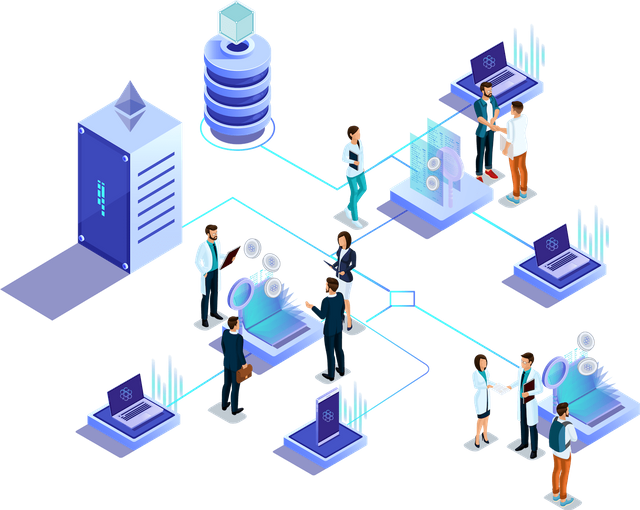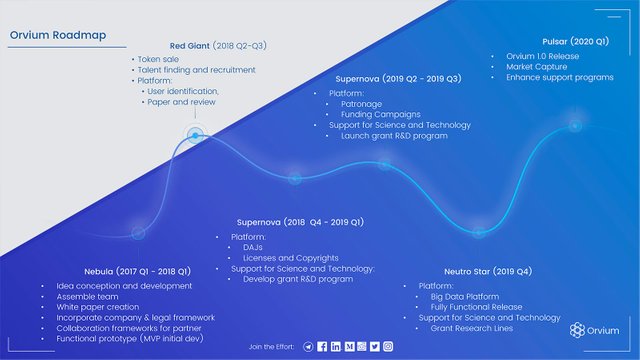Orvium – Blockchain Disruption in Scientific Publishing

The Orvium project is related to the scientific publishing industry and also concerns the concept of Proof of Existence. The first point is related to problems of scientific publications in general, or to be more precise, a problem of interaction between scientists and publishers, as well as the scheme of financing of scientific researches, peer reviews, and publications. According to project founders, a key problem in this field is an unfair way, the money, flowing into this area, are distributed among the actors. Or to put it differently: Most of the scientific research is funded by governments, and peer reviews are done on the voluntary basis by scientists who are also on the government payroll at that moment. Publishers don't bring anything valuable to this scheme on this stage. Meanwhile, after the research is done and reviewed, they get profits from publishing it. At the same time, it doesn't bring any monetary benefits to scientists and reviewers. In fact, publishers sell back to the scientific community the materials that were produced by it in the first place. So the publishers, without investing anything in the scientific work, eventually get hold of the fruits of its labor. More to that, they also own respective patents and licenses as well. This perverse system is called triple pay, and it raises a lot of questions among the scientific community. Clearly, the system is unfair. How ideally it should be instead: both scientists and reviewers should have an opportunity to get some commercial benefits from publishing their work, or, at least, publishing and distribution of final documents should be free. Also, it doesn't make much sense that patents and copyrights are held by entities that have nothing to do with scientific work, to begin with, namely publishers. In part this situation has formed due to the monopoly of a few publishers in the scientific field, who dictate their terms. Another contributing factor is the difficulty of establishing and confirming provenance and authenticity of the scientific data and materials. For example, it can lead to arguments about who first came up with a certain idea, set of experimental results, or theoretical conclusions. The authorship is usually secured through patent registration, but the process of registering scientific patents is slow, and still, the level of contribution of individual participants remains unclear.
In this sense, the Proof of Existence is a simple but useful concept of registering respective materials on the blockchain. Proof of Existence implementing platforms work in the following way: When I want to secure the authorship of some material, I submit this document to the system; the document then is registered on the blockchain. It means that the platform calculates a unique hash of that document, which unmistakably identifies it. There cannot be another document with the same hash. Also, the record is timestamped, which later can serve as a proof that the document existed at a certain time. (Hence the name) After several other blocks are added on top of the block containing this unique signature of my material, it becomes virtually impossible to alter the record. Each new block in the blockchain is sealed with a hash, calculated based both on its own data and the hash of the previous block. In other words, it means that to alter the record the perpetrator would need not only to recalculate the hash of the block containing that record (Otherwise the hash simply wouldn't match the contents of the block, showing that it has been tampered with) but the hashes of all the following blocks as well. Considering the computational difficulty of calculating blockchain hashes, this process would take so long and would require so many resources that it simply can be said that altering the records committed to the blockchain is technically unfeasible. At the same time, such system doesn't disclose the contents of the document simply because it doesn't store it. All that's needed is to store information, reliably identifying the author, time when the document was introduced to the system, and the hash calculated based on the aforementioned data and the whole contents of the document, so any attempt to alter this information would invalidate the hash. The incremental sequence of blockchain record timestamps prevents the situation when somebody tries to register the same material later on his own name, with a timestamp showing earlier time than the original record, and then claim ownership. The ability to record the proof of document's existence without the need to reveal its contents can be valuable, for example, when this information concerns the results of some secret experiments or research.

Orvium uses the Proof-of-Existence concept to create an ecosystem encompassing scientific research, peer reviews, and publishing. Its primary goal is to improve the previously described situation with scientific publishing. Its two main vectors are making registering authorship of scientific papers easier and faster and giving researchers and reviewers an economic incentive. Within this business model, they are actually the ones who get monetary rewards for their efforts. At the same time, the system strives to eliminate publishers as unnecessary intermediaries who don't provide any valuable contribution to the scientific ecosphere.
So, what’s the Orvium platform? First, it’s a social, collaborative environment, organizing researchers, reviewers, and publishing entities on a single unified platform. As opposed to the traditional life cycle of scientific papers, Orvium platform introduces a continuous process of submission, re-submission, and reviewing of scientific work. The blockchain based Proof of Existence component eliminates problems related to proving document's authorship, and confusion about different versions of the same material. Documents can be submitted to the system multiple times on each intermediate stage of their development. The platform provides a clear picture, regarding the sequence of changes that were made on each step. Also, the scientific work can be reviewed at each step, which allows revealing possible problems and mistakes on early stages and, in general, makes the process more efficient. Another platform's feature that adds a social network element to the traditional approach of scientific collaboration is multi-peer reviews, that is, reviews made collectively by a group of scientists, organized in an ad-hoc manner. In this case, the platform provides an environment, in which reviewing is a continuous organic process, with the system recording the progress made on each step, as well as the contribution of each participant. Also, another important difference is that reviewers get monetary rewards for their efforts, which, in turn, further encourages cooperation of platform's participants. After scientific research is finished, Orvium provides means for its instant, zero-delay publication. Scientific journals on the platform are supposed to run as decentralized autonomous organizations, governed by scientists themselves. The number of such self-governed entities can be unlimited, and their reputation and credibility will be established by the quality of published materials, which can also be easily verified since each document's life-cycle and history of reviews are recorded on the blockchain. In addition to the scientific papers themselves, the project's infrastructure can also include all the referenced data and experimental results. The project plans to utilize decentralized data storage technologies to create an integrated infrastructure, incorporating and providing access to all the materials produced in the process of scientific research.

Overall, it seems like a promising idea, offering solutions in a field not yet covered by a wave of blockchain-driven disruption. Considering the conservatism of the scientific community, probably it won't be easy to quickly reach any significant network effects there, but in case the project will receive enough attention and support, it has a good potential to reshape the ecosystem of scientific publishing.
In July August 2018, Orvium will conduct a token sale, aiming to distribute 60% of its total supply of 379,000,000 ORV tokens. The fundraising goal is $20,000,000

"Science via the blockchain" sounds fair. Will it prevent manipulation of science by the big corporations?
It's one of the reasons for developing project like that on the blockchain. This problem is huge. A lot of fake reports from science researches especially for food. For example "coffee is good for health" or "drink milk every day for more calcium" and other shitty recommendations by the big corporations.
Подписался на тебя! и поставил голос!
Подпишись тоже пожалуйста вот СЮДА - https://steemit.com/@russ512
Спасибо.
Congratulations! This post has been upvoted from the communal account, @minnowsupport, by khalik.faradzhli from the Minnow Support Project. It's a witness project run by aggroed, ausbitbank, teamsteem, theprophet0, someguy123, neoxian, followbtcnews, and netuoso. The goal is to help Steemit grow by supporting Minnows. Please find us at the Peace, Abundance, and Liberty Network (PALnet) Discord Channel. It's a completely public and open space to all members of the Steemit community who voluntarily choose to be there.
If you would like to delegate to the Minnow Support Project you can do so by clicking on the following links: 50SP, 100SP, 250SP, 500SP, 1000SP, 5000SP.
Be sure to leave at least 50SP undelegated on your account.
Ok. Thanks.
This post was resteemed by @steemvote and received a 99.25% Upvote. Send 0.5 SBD or STEEM to @steemvote